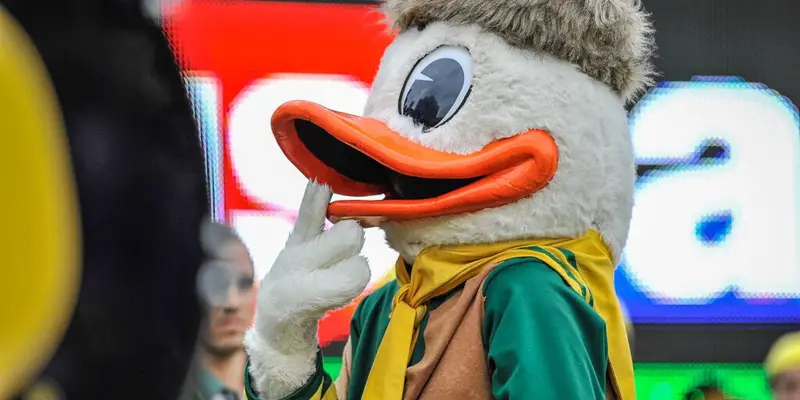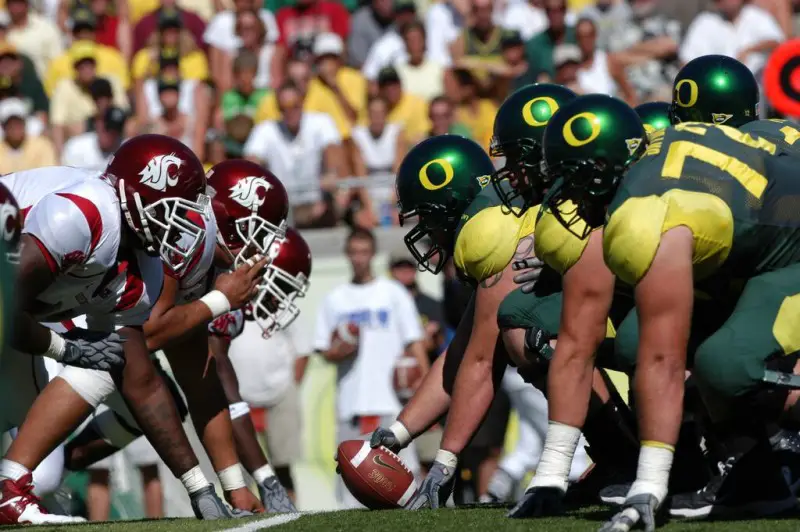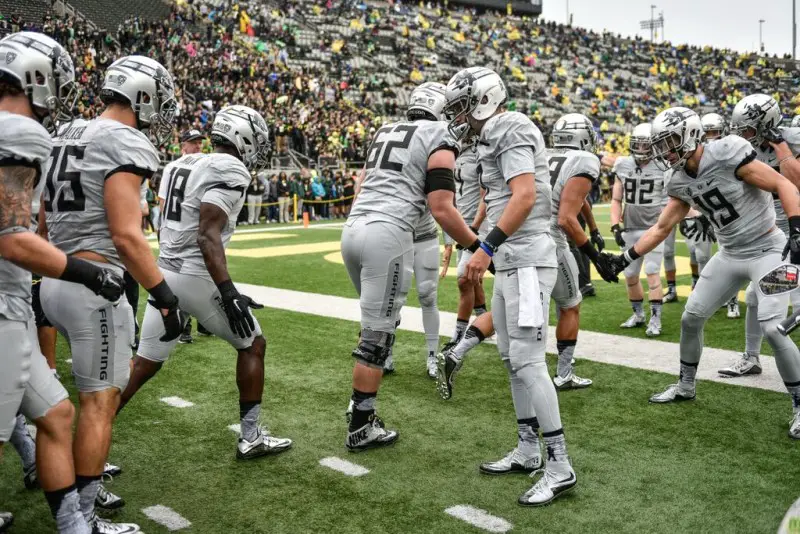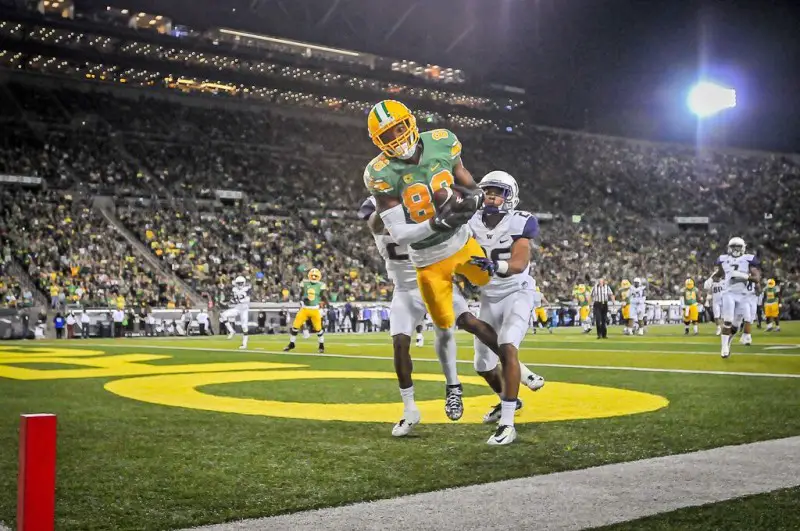There was a theme to Saturday’s game, from the pioneer uniforms to the football team reunion; much of the focus was on the past. It is understandable why that would be the concentration of everyone’s attention: Thus far, 2015 has not been a year to remember. At the halfway point of the season, the Oregon Ducks sit at a paltry 3-3.
Most notable among their losses this year was the 40-point thrashing the Ducks received at the hands of Utah two weeks ago, which as you may have heard, was the worst loss the Ducks suffered at home since 1977. And it was so much worse. The ’77 Ducks lost a 54-0 thriller on their way to a 2-9 record.
But losing 54-0 at home is the type of loss two-win teams tend to have. Losing by 40 is less common among teams selected as preseason division favorites. As a matter of fact, in the history of Oregon teams, none have ever made a bowl game with a 40-point home loss.
The closest example of a similar home blowout was a 39-point loss in 2003 to Washington State. Coming off one of the biggest wins in school history against Michigan the week prior, a flat Oregon team had their doors blown off early, trailing 38-2 at halftime, before scoring two second-half touchdowns to end the game with a slightly more tolerable 55-16 final.
The same team took some big losses that season, losing by 45 to Arizona State and 32 to Washington, but finished with a respectable 8-5 record. As Fox Sports’ Bruce Feldman pointed out last week, the last five schools that replaced a Heisman Trophy-winning quarterback have all gone 8-5 . That may seem like an unrealistic mark right now, but the Ducks have only to go 5-2 to get there, and they definitely have the talent for it.
As I mentioned in an earlier article, in 2003 then-head coach Mike Bellotti was inspired to re-invent the Oregon program.
The cost of that inspiration was a blowout loss to Washington State, which happened to be the last time the Cougars won in Eugene (before Saturday), followed by a loss to Utah — these losses stung. The Cougars enjoyed a 10-win season, while the Ducks faced the less glorious task of self-evaluation. But their trajectories changed following that season.
The 2003 Cougs were coming off a Rose Bowl the previous year, their second in five years. It was an unprecedented time for Washington State, as they established themselves as one of the most successful programs in football.
So successful that long-time head coach Mike Price left Pullman for Alabama the previous winter. One of Price’s long-time coordinators, Bill Doba, filled the vacancy, and at first, it looked to be business as usual for Washington State.
They won 10 games and finished 9th in the country during Doba’s first year. But the Cougars quickly dropped off, losing six or more games each of the next four seasons, and by the end of 2007, Washington State was at the bottom of the Pac-10 pecking order. Doba was gone.
It would be the easy and lazy task, to point the finger at the coach. Washington State’s drop-off had far more to do with the execution of its culture, specifically in recruiting, than anything else.
It wasn’t that they couldn’t recruit, it was that the recruits they got didn’t fit the program. The Cougars kept chasing four- and five-star recruits and missing out, so eventually, the quality of the roster in Pullman fell off.
Washington State was too married to the way things had been, and not cognizant enough of what they were at that time. Oregon currently finds itself in a similar place, trying too hard to be what it was and not what it can be.
They need to forget about the past, no matter how recent.
Ducks fans hate when curmudgeonly sportswriters snark at Oregon’s staying power amongst college football’s top programs, but because of the short duration of their success relative to the history of college football, the Ducks haven’t really proved that they can stay at the top.
But the Ducks have found success over the past two decades by leveraging every advantage available to them. They examined how to attack better teams, and they assessed how to match-up against better players.
They were honest about who they were, and maximized what assets they had. They couldn’t just be an elite program, so they had to act like one — and it worked! But while Oregon has been believing it is an elite program, the rest of the PAC-12 has been closing the gap. Oregon has lost what got it to the top: Hunger and identity.
Oregon’s struggles this season appear to stem not from a lack of resources, but the misapplication of those resources.
The Ducks have plenty of talent on the roster, as much as any team in the Pac-12. In his post-game interview on Saturday, Mike Leach said, “… they don’t have one guy on their roster who didn’t have an offer from 15 other schools.”
But the challenges for the Ducks this season haven’t come from a dearth of talent, but a visible rigidity in trying to replicate the style of play from recent seasons and apply it to a team that needs a different framework.
This Oregon team isn’t like those teams from the recent seasons. Challenges are always unique to circumstance.
While the Ducks currently enjoy nearly unmatched resources relative to its conference members, their rivals have leveraged their hunger, and focused their efforts to catch up.
For Oregon to go 8-5 this season, it has to focus on leveraging what it has and who it is, rather than trying to figure out how to be who they were. That was the beauty of seeing Charles Nelson starting at safety on Saturday; it demonstrated a small step in a commitment in that direction.
This week provides Oregon with the chance to get back to its roots. Oregon built its reputation and its success on overcoming a Washington program that had long held them down.
Despite 11 straight wins, the Ducks find themselves two-point underdogs to Washington. A win this Saturday will be a big step in rebuilding their identity and get the Ducks back on the right track.
Top photo by Kevin Cline
Nathan Roholt is a senior writer and managing editor emeritus for FishDuck. Follow him on Twitter @nathanroholt. Send questions/feedback/hatemail to nroholtfd@gmail.com.




